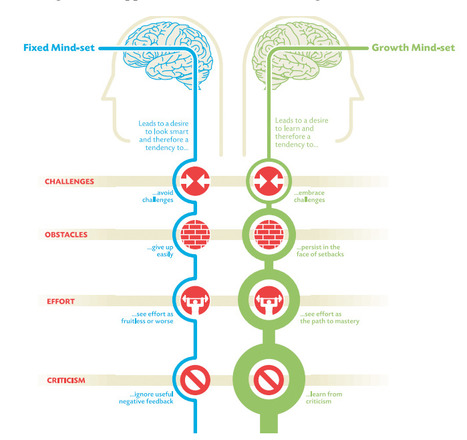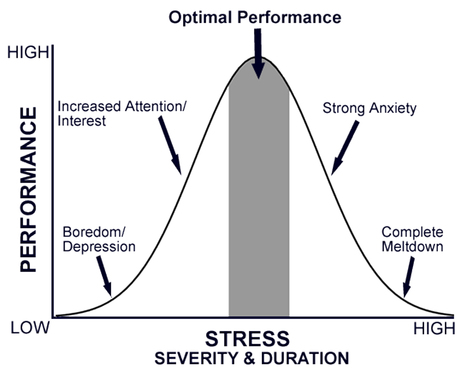 Your new post is loading...
 Your new post is loading...
There might still be some professionals and executives out there who long for the "good, old days" of workplace management. The days when you told your employees what to do and expected them to just get on with it. Assuming they didn’t want to suddenly find themselves unemployed. But obviously that’s not you is it? You understand that leadership in the modern world is about engagement, about winning hearts and minds across your team. Above all, about being "authentic." Authenticity has become a favorite buzz-word in management circles and research suggests it is an important characteristic for leaders to have. In these days of galloping cynicism about leaders of all types in organizations big and small, in business or politics, being seen as someone who actually aligns the values they propound with their actions seems to be highly motivating. And this, in turn leads to better staff retention, closer team cohesion and improved performance.
Via The Learning Factor
Are you one of the never satisfied strivers? The type of person who, despite having some obvious successes in life--a solid career, a modicum of financial security, the respect of your peers--just never feels like you've quite made it? Are you always a little worried you could be accomplishing more? If so, you probably feel kind of crummy sometimes compared to your more easily contented competitors, but according to new research out of Stanford, all your ambition has a serious upside (hat tip to Science of Us for the pointer). Perpetually feeling like you're a bit unsuccessful, it turns out, is a pretty good sign you're going to go on to achieve even greater things.
Via The Learning Factor
Why do people complain? Not to torture others with their negativity, surely. When most of us indulge in a bit of a moan, the idea is to "vent." By getting our emotions out, we reason, we'll feel better. But science suggests there are a few serious flaws in that reasoning. One, not only does expressing negativity tend not to make us feel better, it's also catching, making listeners feel worse. "People don't break wind in elevators more than they have to. Venting anger is...similar to emotional farting in a closed area. It sounds like a good idea, but it's dead wrong," psychologist Jeffrey Lohr, who has studied venting, memorably explained. OK, so complaining is bad for your mood and the mood of your friends and colleagues, but that's not all that's wrong with frequent negativity. Apparently, it's also bad for your brain and your health. Yes, really.
Via The Learning Factor
There are a ton of qualities that can help you succeed, and the more carefully a quality has been studied, the more you know it's worth your time and energy. Angela Lee Duckworth was teaching seventh grade when she noticed that the material wasn't too advanced for any of her students. They all had the ability to grasp the material if they put in the time and effort. Her highest-performing students weren't those who had the most natural talent; they were the students who had that extra something that motivated them to work harder than everyone else. Angela grew fascinated by this "extra something" in her students and, since she had a fair amount of it herself, she quit her teaching job so that she could study the concept while obtaining a graduate degree in psychology at the University of Pennsylvania. Her study, which is ongoing, has already yielded some interesting findings. She's analyzed a bevy of people to whom success is important: students, military personnel, salespeople, and spelling bee contestants, to name a few. Over time, she has come to the conclusion that the majority of successful people all share one critical thing--grit. Grit is that "extra something" that separates the most successful people from the rest. It's the passion, perseverance, and stamina that we must channel to stick with our dreams until they become a reality.
Via The Learning Factor
When it comes to success, it’s easy to think that people blessed with brains are inevitably going to leave the rest of us in the dust. But new research from Stanford University will change your mind (and your attitude). Psychologist Carol Dweck has spent her entire career studying attitude and performance, and her latest study shows that your attitude is a better predictor of your success than your IQ. Dweck found that people’s core attitudes fall into one of two categories: a fixed mindset or a growth mindset.
Via The Learning Factor
Is getting an MBA worth it? It's a fraught question with passionately argued cases on both sides of the debate. But whether you think a stint at a top-tier business school is overpriced and creativity dulling or a golden ticket to success, everyone would have to agree that getting the knowledge of an MBA without the huge price tag or two-year time commitment is a great deal. Which makes a recent Medium post by Ellen Chisa a must read who for anyone who is unlikely to make it over to Boston to attend HBS any time soon. A current student, Chisa generously walks readers through the ten courses every first-year MBA student must take and reveals the most mind-blowing insight she took away from each. Some of her course descriptions will be of interest only to those in certain industries or roles, while others resist summarizing (but are still well worth a read in full). Here, however, are those that can be boiled down for entrepreneurs, along with several case studies (purchase required) that Chisa recommends if you want to do further reading. .
Via The Learning Factor
The ability to manage your emotions and remain calm under pressure has a direct link to your performance. TalentSmart has conducted research with more than a million people, and we’ve found that 90% of top performers are skilled at managing their emotions in times of stress in order to remain calm and in control. The tricky thing about stress (and the anxiety that comes with it) is that it’s an absolutely necessary emotion. Our brains are wired such that it’s difficult to take action until we feel at least some level of this emotional state. In fact, performance peaks under the heightened activation that comes with moderate levels of stress. As long as the stress isn’t prolonged, it’s harmless.
Via The Learning Factor
|
Can you imagine working for someone in a high-level leadership role, perhaps a CEO, and suddenly it dawns on you: This person isn't leadership caliber. Your next thought may be, How in the world did he (or she) make it this far up the ladder? It's a fair question. People are promoted into leadership roles every day who have no business belonging there. Sometimes it's political; other times it's the easier choice--promote from within and avoid the high cost of recruitment--but a bad choice, nonetheless. The biggest challenge leaders face is performing to the set standards of the best in the business. This means raising the bar really high--as the ten hugely successful CEOs I wrote about recently have done. In the end, you'll find the leadership journey is predicated on two things that drive success: Results and relationships. You can't have results at the expense of people. And serving your tribe well without getting results is merely putting lipstick on a pig.
Via The Learning Factor
How you spend your night can have a huge impact on the day that follows. Do you spend your time ruminating over issues? Or maybe you stress over something that didn't quite go right during the day. There's no doubt, how you think affects how you feel. This is particularly important at night as you try to unwind and prepare for rest. This sets you up for sleep which serves many vital purposes. When I look at my clients who achieve the most during their days and are happiest, they are the ones who have a healthy routine at night. They set themselves up for success the following day by thinking and acting in a particular way.
Via The Learning Factor
Imagine you want to design a robot that can get through a maze by itself. How might you go about it? First, you would probably define the robot’s objective: Find the exit of the maze. Then you would create a mechanism to reward the robot for moving toward that goal and to punish it for moving farther away, so that over time it finds its way out. But what if the robot comes to a dead end right next to the exit? It’s geographically as close as possible to its objective but it can’t get there. And it won’t want to turn around because that would mean moving away from the goal and getting punished. Your robot would be stuck. Kenneth Stanley is a professor in artificial intelligence who has studied this problem, the stagnation that can result from dogged pursuit of a prescribed goal. Eventually he and his colleagues arrived at a simple solution. What if instead of rewarding the robot for getting closer to the maze exit, they rewarded it for trying new and interesting directions? They found that this shift in programming significantly improved the robots’ ability to solve mazes — a successful result in 39 out of 40 trials, versus 3 out of 40. Testing objective-less challenges in many other AI contexts, Stanley got similar results. When made to seek novelty, his robots developed surprising and creative solutions to problems they could not previously solve.
Via The Learning Factor
Many years ago, I applied for a promotion I desperately wanted. At the time, I was the highest performer in the department and so everyone, including me, unwisely expected the big fancy job to be mine. It wasn't. Despite going for three interviews and enduring one of those excruciating psychometric tests, I was duly informed my application had been unsuccessful. What was most intriguing, however, was the reason the executive gave for rejecting me: "James," she said, "you need to realise that sometimes it's not how well you perform a job that matters; it's how well you understand office politics." She then proceeded to write down the name of a book on the topic, which I was required to obediently read before applying again in the future.
Via The Learning Factor
Are you a successful leader? This is a difficult question to answer: No matter how good you think you are, the only evidence of leadership is whether people follow you. Self-serving bias distorts your perception of your own successes and failures. Even if you’re incredibly self-aware, you may have trouble with an objective assessment because your direct reports may only appear to be following — they don’t get an option to be physically present — and not every company conducts rigorous engagement surveys or 360-degree reviews. So how can you gain a reasonably accurate understanding of your success as a leader? Try integrating three distinctive views.
Via The Learning Factor
Everyone wants to be recognized for doing a good job, to be able to earn promotions and raises and to move up the organization. However, the path isn't always clear, and sometimes we are our own worst enemies--standing in the way of our own success.
Via The Learning Factor
As the world increasingly looks for a workforce built on intellectual property and creativity, it’s important to consider the merits of our educational system. There is growing evidence that entrepreneurship and small business ownership characterize the way to economic prosperity. This raises the question: Can entrepreneurship be taught? As a result, I am asked more and more frequently how I “did it.” Other entrepreneurs have used their college years to meet the people who would eventually be their business partners. Facebook, Microsoft, reddit, WordPress and Yahoo! were all conceived in college dorm rooms.
Via The Learning Factor
|



 Your new post is loading...
Your new post is loading...





































Behavioral integrity is effective, because it improves your communication. And you can develop it.